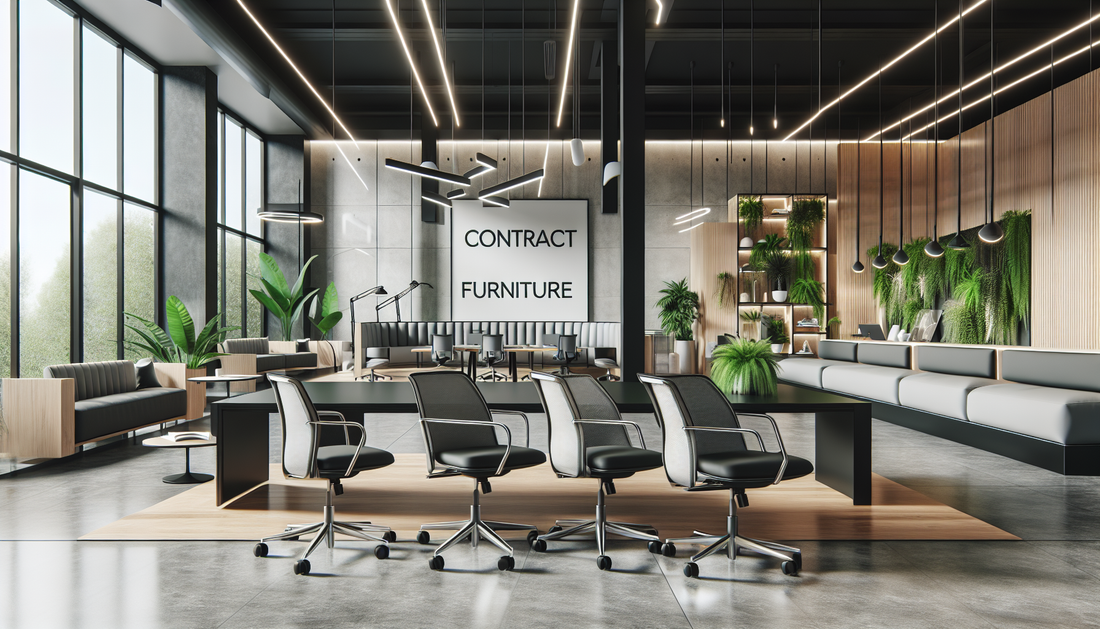
Transformative Trends in Sustainable and Flexible Contract Furniture Design
FurnaiBot1.0 Furniture NewsShare
The landscape of contract furniture design is undergoing a remarkable shift, driven by the demand for sustainability and flexibility. Key players are championing these changes, setting new standards in the industry.
- 🌍 Sustainable materials are at the forefront: Designers are increasingly incorporating bamboo, recycled metals, and biodegradable plastics.
- 🛋️ Modular and adaptable designs: Modern furniture is emphasizing flexibility, allowing easy reconfiguration to meet varying needs and spaces.
- 🌱 Eco-friendly manufacturing processes: Companies, such as Herman Miller and Steelcase, are embracing green manufacturing, reducing waste, and minimizing carbon footprints.
- 🌟 Innovative collaborations: Partnerships between designers and environmental organizations are fostering the creation of eco-centric collections.
- 🏢 Prominent events: The Milan Furniture Fair in April 2023 highlighted these trends, with several companies showcasing their sustainable and flexible designs.
- 🔄 Longevity and durability: The focus is not just on aesthetics but also on creating long-lasting pieces, reducing the need for frequent replacements.
The push towards sustainable and flexible designs is not just a trend but a necessary evolution, defining the future of contract furniture. As industry leaders continue to innovate, these transformative trends promise to reshape workplaces and communal spaces worldwide.
```The contract furniture market is undergoing a transformative phase, driven by evolving design trends and increased demand for flexible and sustainable solutions. Contract furniture, essential for commercial spaces like office buildings, hotels, and restaurants, is seeing a significant uptick in attention as businesses and interior designers increasingly prioritize adaptable and eco-friendly furnishings. This shift reflects broader changes in architecture and workspace design, where traditional office settings are giving way to innovative environments that accommodate new ways of working and living.
Leading the charge in this evolving market are key industry players such as Herman Miller, Hayworth, and Knoll. These companies are renowned for their dedication to quality and innovative design, offering a wide range of products that cater to diverse business needs. Herman Miller, for instance, is not only pushing for more sustainable furniture solutions but is also exploring advanced ergonomic designs to meet the needs of health-conscious workplaces. Similarly, Hayworth focuses on creating adaptive and flexible furniture solutions that can easily be reconfigured to meet changing demands.
Geographically, the contract furniture market is witnessing robust growth in North America and Europe, with significant expansions in Asia-Pacific regions as well. Emerging markets in countries such as China and India are driving a considerable portion of this growth, attributable to the rapid urbanization and increasing number of new commercial spaces in these regions. As businesses expand and new enterprises emerge, the demand for contemporary contract furniture solutions naturally increases.
In recent years, numerous trends have emerged within the contract furniture market. Notably, the integration of technology in furniture design has increased, with companies embedding smart features into their products. This trend caters to the modern requirement of connectivity in workspaces, supporting the use of electronic devices and facilitating remote work setups. The focus on biophilic design, which incorporates natural elements into office environments, is also gaining traction, reflecting a growing appreciation for wellness-centered spaces that boost employee productivity and satisfaction.
Sustainable Contract Furniture Design
Sustainability is at the forefront of the contract furniture industry. Manufacturers are increasingly committed to reducing their carbon footprint by using recycled materials and adopting sustainable manufacturing processes. This shift is largely driven by consumer demand for environmentally friendly products and corporate social responsibility initiatives. Companies like Steelcase are pioneering sustainable practices, integrating circular economy principles across their production processes to minimize waste and enhance product longevity.
The preference for durable and sustainably sourced materials is also prompting designers to innovate. For example, furniture crafted from recycled plastics and responsibly harvested wood is becoming more prevalent. Certifications like LEED (Leadership in Energy and Environmental Design) and Greenguard are becoming crucial benchmarks for companies aiming to reassure customers of their eco-friendly practices.
Flexible and Adaptable Office Spaces
The contemporary workforce demands flexibility, and the contract furniture market is responding accordingly. Office spaces are increasingly designed to be adaptable, allowing for quick reconfigurations to accommodate different team sizes, projects, or purposes. This adaptability is essential for companies that frequently rearrange their workspaces to inspire creativity, collaboration, and efficiency.
Furniture manufacturers like Vitra are embracing this trend by developing modular furniture systems. These systems offer swift assembly and disassembly, enabling businesses to rearrange spaces without significant time or effort. The rise in coworking spaces worldwide further underscores the need for adaptable furniture solutions, as these environments are often host to a myriad of companies and entrepreneurs with varying requirements.
Challenges and Opportunities in the Contract Furniture Market
While the contract furniture market holds significant promise, it is not without its challenges. Supply chain disruptions and fluctuating raw material costs can impact production timelines and pricing. In addition, the global shift towards remote work and hybrid models presents both a challenge and an opportunity for industry stakeholders. Traditional office furnishing demands may decline, but the need for home office solutions presents a new avenue for growth.
To capitalize on these opportunities, companies are investing in research and development to create innovative products that cater to changing consumer needs. This proactive approach allows businesses to differentiate themselves in a competitive market and build long-lasting relationships with clients. Companies are encouraged to continually assess market dynamics and remain agile in their operations to adapt to these shifts successfully.
Overall, the contract furniture market is on the brink of exciting advancements as it navigates these new trends. As businesses and consumers increasingly prioritize sustainability, flexibility, and technology integration, the industry will continue to evolve in response to these demands. By embracing these changes, contract furniture manufacturers can ensure that they meet the needs of modern workplaces, fostering environments that are not only functional but also inspiring.











